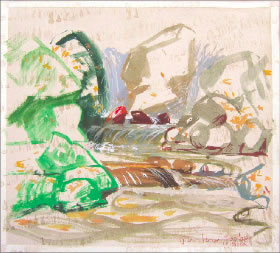(Tips for high-altitude gardeners)
by Suzanne Ward
Summer Solstice has passed and it is now the warmest time of the year. It’s difficult to remember the cold, dark days of winter – back when we were pining for the warmth of the summer sun.
By now you should be enjoying some of the fruits of your gardening labor.
All that early work begins to pay off. Lettuces, varieties of kale, radishes, spinach and all of those greens are in full bloom by now. My daughter is currently eating some of her early tomatoes. The yellow and green zucchini are also coming on. Enjoy those beautiful, fresh vegetables from your garden and congratulate yourself on all you have accomplished.
Weeds are also now in full bloom and dealing with them is essential to a successful garden. Cultivate the garden with a hoe to help keep your plants healthy. You can also choose to pull the weeds by hand. Whatever your method, avoid stepping on the plant beds and compacting the soil. Walk between the beds for weed control. Cultivation also loosens the soil and allows water and air to penetrate. Avoid cultivating with a hoe after a rain or a thorough watering as it may result in digging up large chunks of soil, although hand-weeding after watering is fine. Keep on top of the weeding so you do not become discouraged by attempting do it all at once. Weeding can be especially overwhelming in this hot weather. A little weeding each day in the cool of the morning or evening is the best method.
The weeds may be put into your compost pile to add to next year’s soil. If you have no compost pile, put the weeds in a black plastic bag and set them aside. In a few months time you will have beautiful organic compost.
Another way to minimizing weeds is to mulch your garden. Mulch is a layer of material which is placed on the surface of the soil and around the plants. There are several advantages to mulching.
Mulching regulates soil temperature. Mulched plants are not exposed to the extremes of temperature, both hot and cold, and it acts as a blanket, keeping the soil at an even temperature. It also helps retain soil moisture in the hot summer sun. Underneath the mulch, the soil is often cool and moist, no matter what the outside temperature. This also saves on watering. Mulching protects the plants from erosion during rainfall and damage from the wind and adds to the organic mixture of the garden, turning into humus during the season. Water filtering through the mulch also adds to the minerals in the soil.
Among the various mulches to choose from are straw, grass, newspapers, leaves and black plastic sheeting. Determine what works best for you in terms of availability, cost and the aesthetics of your garden. Another consideration is the size of your garden. Large, coarse mulches are difficult to handle in small gardens. Large gardens require too much of the smaller mulch material.
Straw is good for larger gardens. You can obtain it in bales, which makes for easier handling. Peel off the layers and lay it down in open spaces.
Sawdust is better if it is beginning to decompose and is easy to handle for smaller gardens. One inch is enough to put onto your small garden.
Leaves are also used as mulch. When wet, leaves compact and begin to create leaf mold – an enriching organic for your soil. Add about three to four inches.
Newspapers are also readily available. Those who consider them unsightly might choose to cover the papers with soil. The papers will decompose and become part of the soil. Don’t use color ones, though – they contain toxins from the ink.
Black plastic can warm up the soil and is beneficial for warm weather crops such as tomatoes, peppers, melons, eggplant and squash but does not decompose and won’t add organics to the soil. I tend to reject plastic mulching for my vegetable garden.
Mulching is best done after the plants are established. It is an easy, organic way to improve your garden soil, save water, keep weeds down and produce more vegetables with less work.
Enjoy your time in your garden this month. It is coming into full fruition and is a beautiful place to spend time. You are co-creating with the Earth.
?
Suzanne Ward lives in Salida.? When she is not gardening she is involved in sustainability projects.


